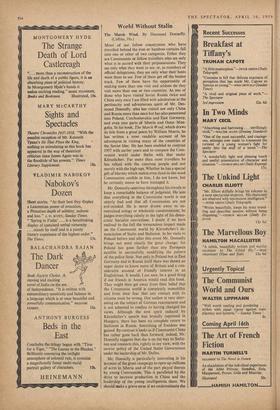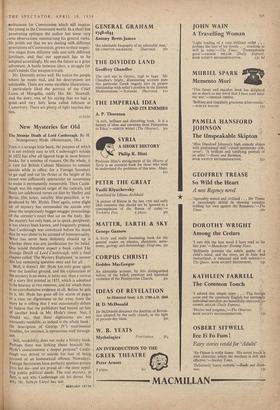World Without Stalin
The March Wind. By Desmond Donnelly. (Collins, 18s.)
MOST of our fellow countrymen who have travelled behind the iron or bamboo curtains fall
into one or other of two categories. Either they are Communists or fellow travellers who see only what is in accord with their prepossessions. They see only what they want to see; or, as members of official delegations, they see only what their hosts want them to see. Few of them get off the beaten track. Few of them have the opportunity of making more than one visit and seldom do they visit more than one or two countries. As one of
those who have visited Soviet Russia twice and China only once I am filled with admiration at the pertinacity and adventurous spirit of Mr. Des- mond Donnelly, who has visited not only China and Russia more than once but has also penetrated into Poland, Czechoslovakia and East Germany, and even into parts of Siberia and Outer Mon- golia. In his book, The March Wind, which draws its title from a great poem by William Morris, he has written a most readable account of his adventures in visiting many of the countries of the Soviet bloc. He has been enabled to contrast 1957 with earlier years and to compare the Com- munist world under Stalin with that under Khrushchev. Far more than most travellers he has talked with the common people and not merely with the high-ups. Whether he has a special gift of blarney which makes even dyed-in-the-wool Communists confide in him, I do not know, but he certainly seems to have managed it.
Mr. Donnelly contrives throughout his travels to keep a remarkable balance of judgment. He sees that everything in the Communist world is not utterly bad and that all Communists are not evil-minded. He is never drawn away to un- restrained eulogy or wholesale condemnation; he judges everything calmly in the light of his demo- cratic Socialist convictions. I doubt if we have realised to the full the tremendous impact made on the Communist world by Khrushchev's de- nunciation of Stalin and Stalinism. In his visits to Poland before and after this event Mr. Donnelly brings out most clearly the great change; for Poland has gone farther than any European satellite in successfully modifying the pattern of the police State. Not only in Poland but in East Germany and in Russia itself there was shown an eager desire to know more of Britain and a con- siderable amount of friendly interest in an Englishman. It would, I am sure, be a good thing if our friends in America would read this book. They might then get away from their belief that the Communist world is completely monolithic and from their fear that any contact with its citizens must be wrong. Our author is very inter- esting on the subject of German rearmament and is not ashamed to confess to having changed his views. Although the new spirit induced by Khrushchev's speech was brutally repressed in Hungary, there has been no complete return to Stalinism in Russia. Something of freedom was gained. By contrast it looks as if Communist China has rather gone back than forward; indeed, Mr. Donnelly suggests that she is on the way to Stalin- ism and connects this, rightly in my view, with the unwise policy of the United States Government under the leadership of Mr. Dulles.
Mr. Donnelly is particularly interesting in his account of the great campaign to open up millions of acres in Siberia and of the part played therein by young Communists. This is paralleled by the drive to increase production in China and the leadership of the young intelligentsia there. We should make a grave error if we underestimate the
mthusiasm for Communism which still inspires he young in the Communist world. In a short but penetrating epilogue the author has some very vise observations summarising his general views. 'le points out that we are dealing with different generations of Communism, grown to their respec- ive stages from different soils and with different 'ertilisers, and that our approach has to be idapted accordingly. He sees the future as a great Idventure. A battle between ideas, a struggle for hen's minds. Our weapon is truth.
Mr. Donnelly writes well. He makes the people ?Thom he meets real, and his descriptions are idmirable. There are some excellent illustrations. particularly liked the portrait of the Chief Lama of Mongolia, oddly like. Mr. Shinwell; and the story, too, of his saying that we had a ;Teat and very holy lama called Johnson at Canterbury. There are plenty of light touches like ,his.
ATTLEE















































 Previous page
Previous page